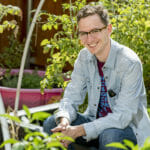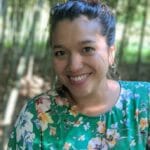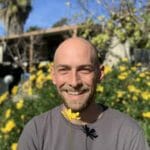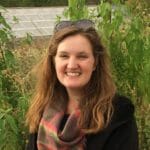To create the inclusive, diverse and resilient food systems of the future, we need bold and knowledgeable change agents to transform public policy.
We are thrilled to announce Arizona State University’s Food Policy & Sustainability Leadership 2020-2021 class. With a commitment to shaping food and farm policy in the public interest, this cohort of leaders hails from across the country including Arizona, Colorado, Louisiana, Maryland, Michigan, Minnesota, Mississippi, North Carolina, Oklahoma, Tennessee, Texas, and Washington, D.C.
These rising stars represent business, nonprofit, and academia, modeling the community necessary for food system transformation. They’re passionate about reducing food waste, regenerative agriculture, and climate resistant agriculture. They’re dedicated to school food reform and food sovereignty.
They are the future of food.
Meet the Leaders
Francisca Alvarado

Fran recently graduated from Northern Arizona University with a Master’s degree in Sustainable Communities. Her thesis focused on plastic policy analysis and understanding how small communities reduce plastic waste at a local level.
After graduating, Fran joined FoodCorps where she taught healthy eating, gardening, and composting in an elementary school. Through her composting initiative, she was able to divert two thousand pounds of fruits and vegetables to local pig farms and garden sites. She also established a wicking bed project on the school campus which is a method that requires less water and maintenance than a traditional garden bed.
When not working, Fran enjoys mountain biking, reading, and playing games. She is passionate about reducing waste in our every day lives.
Wesley Conner
Wesley has spent her career working on small-scale farming operations from grass-fed meat, dairy, to experimental vegetable production. She fostered a passion for bridging regenerative agriculture to restaurants while working at Blue Hill at Stone Barns and on the Field Team at Stone Barns Center for Food and Agriculture, and continues to work with small farmers and sustainably-minded businesses. She is a lifelong advocate for building regional food systems with a focus on developing soil health through innovative farming techniques and public seed breeding through land-grant universities. While attending Connecticut College, she received her BA in English and Psychology and studied food anthropology in Vietnam. Wesley is originally from the countryside outside Charlottesville, VA and currently lives in Nashville.
Eric Hemphill
Eric Hemphill is the Manager of Sustainability and Alternative Transportation at the University of Central Oklahoma. In this role, he works with students, faculty, and staff to raise awareness of issues in environmental sustainability. He develops programming focused on local food, waste reduction, environmental justice, regenerative agriculture, and works with faculty to bring sustainability principles into the classroom. He holds a bachelor’s degree in English from Emporia State University and a Master’s in Education from UCO. His research interests focus on the areas of sustainability pedagogy, policy-based solutions, social change, and place-based learning projects. He lives in OKC, where he makes things out of wood, walks his dog, and eats many bowls of pho.
Stu Lourey
Stu serves as Government Relations Director for Minnesota Farmers Union (MFU), where he helps MFU’s family farmer members develop grassroots policy priorities and then drive on those priorities on the state and national level. He grew up on a small farm in east central Minnesota where his family grew organic apples and sold grass-fed beef direct to consumer. Prior to joining MFU, Stu served as a legislative aide to Senator Tina Smith in her Washington D.C. office, where he focused on rural healthcare, education policy, and work with Minnesota’s 11 tribal nations. Before that, he worked in Northeast MN for Senator Al Franken. He graduated from Carleton College in Northfield, MN with a degree in Sociology and Anthropology.
Mackenize Martinez
Mackenize Martinez is a native of Zwolle, Louisiana, and an enrolled Tribal member of Choctaw and Apache descent. She recently graduated with cum laude honors from McNeese State
University, where she earned a Bachelor of Science with a major in Agricultural Sciences and concentration in Animal Science. Mackenize has experience with youth-led food sovereignty
movements and working with various nonprofit organizations aimed to support farmers and ranchers throughout Indian Country. She currently serves as Vice President and Eastern Region Representative for the Native Youth Food Sovereignty Alliance, the youth advisory board of the Intertribal Agriculture Council. Earlier this spring, Mackenize completed an internship in Washington, DC, with the United States House of Representatives Committee on Agriculture, where she also acted as a Fellow with the Native American Agriculture Fund. Mackenize is passionate about engaging with Tribal livestock producers, farm to school initiatives, and helping Native youth connect with their roots as indigenous agriculturalists.
Kana Miller
Kana Miller is a Nutrition Educator at Second Harvest Food Bank of Northwest North Carolina (SHFB), where her work focuses on the connections between hunger and health. By promoting healthy choices and encouraging behavior change, families and individuals build the skills, knowledge, confidence, and resources to plan, create, and enjoy healthy meals on a limited budget. During her time at SHFB, Kana started the Fitzgerald Teaching Garden, which provides additional resources on building gardens at food pantries, nutrition education, and cooking with fresh produce. Kana also serves as an inaugural member of the Piedmont Triad Regional Food Council, where she sits on the “Research, Engagement, and Equity” subcommittee. Prior to joining SHFB, Kana’s background includes a wide range of experience in both food systems and non-profit work. After graduating from Skidmore College with a B.A. in Environmental Studies, she served as a FoodCorps Service Member in Athens, Georgia assisting the Athens Land Trust’s management of the West Broad Market Garden and the Young Urban Farmers youth development program. Originally from Atlanta, Kana has called North Carolina home for 5 years. Based out of Winston-Salem, she and her partner have a small farm growing mixed seasonal vegetables.
Cameron Peterson
Cam grew up in El Cajon, a short drive away from San Diego and the US/Mexico border. He graduated from SDSU with a degree in History and English thinking he’d become a teacher, but an interest in public service and an insatiable appetite for travel lured him into serving 27 months in the U.S. Peace Corps in Ghana, West Africa. There he discovered a deep-seated passion for food systems, community development, and civic engagement.
Since then he’s worked at non-profit organizations, helped carry out a regional farm to school campaign, taught nutrition and gardening curriculum at a rural primary school as a FoodCorps service member, and briefly lived on a coffee farm in the mountains of Nicaragua. All of these experiences have taught him how central food is to society, and he’s excited to apply the knowledge from this program to help advance communities and build resiliency around issues concerning food security, the environment, and much more.
Claire Robertson
Claire Robertson works in international development, supporting the design and implementation of projects focused on community resilience, social cohesion, and transparent and accountable governance around the world. Claire currently leads Democracy International’s Strategy & Outreach Team and previously supported DI’s learning work, designing and implementing evaluations, assessments, and research projects across DI’s democracy, human rights, and governance portfolio. Claire served as a Peace Corps volunteer in Ukraine, where she taught English as a Foreign Language and coordinated other community development, civic education, and health education projects. When not thinking about governance challenges, Claire works at an Italian-style liqueur maker in Washington, DC. Claire holds a M.A. in Government from Georgetown University and a B.A. in Political Science from the University of Pennsylvania.
Mary Rochelle
Mary Rochelle is the Program and Grants Coordinator for the School Food Project, the food services department of Boulder Valley School District. She oversees BVSD’s Farm to School Program and leads communication and promotion of the healthy school food programs to students, staff, parents, and community. During a typical school year, this role includes planning and executing 200+ events per year that center health promotion, local food, food waste reduction, and hands-on cooking experiences. Prior to her current role, Mary served three years with FoodCorps, a national nonprofit and AmeriCorps program which works to connect kids to healthy food in school. With FoodCorps, Mary spent two years as a service member in Montana and one year as the state fellow in Michigan. Mary also worked for five years at the Fresh Ideas Group, a public relations and communications agency that tells the stories of natural and organic companies, primarily in the food industry. While there, Mary created and implemented communication strategies for large corporate clients like Smuckers’ organic brands, Earthbound Farm, and Whole Foods Market, as well as smaller, mission-driven organizations and nonprofits like Slow Money, Chefs Collaborative, and Boulder County Farmer’s Markets. Mary has worked for several organic farms and she finds joy while outside and creating a meal with friends or family.








